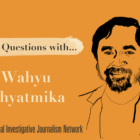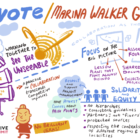10 Questions
What I’ve Learned: Tips from a Pioneer of Collaborative Investigative Journalism in Indonesia
|
It’s impossible to discuss collaboration in journalism in Indonesia without mentioning Wahyu Dhyatmika. Whether initiating partnerships, building collaborations, or reporting, he has played an instrumental role in many of the biggest investigations in recent years.









